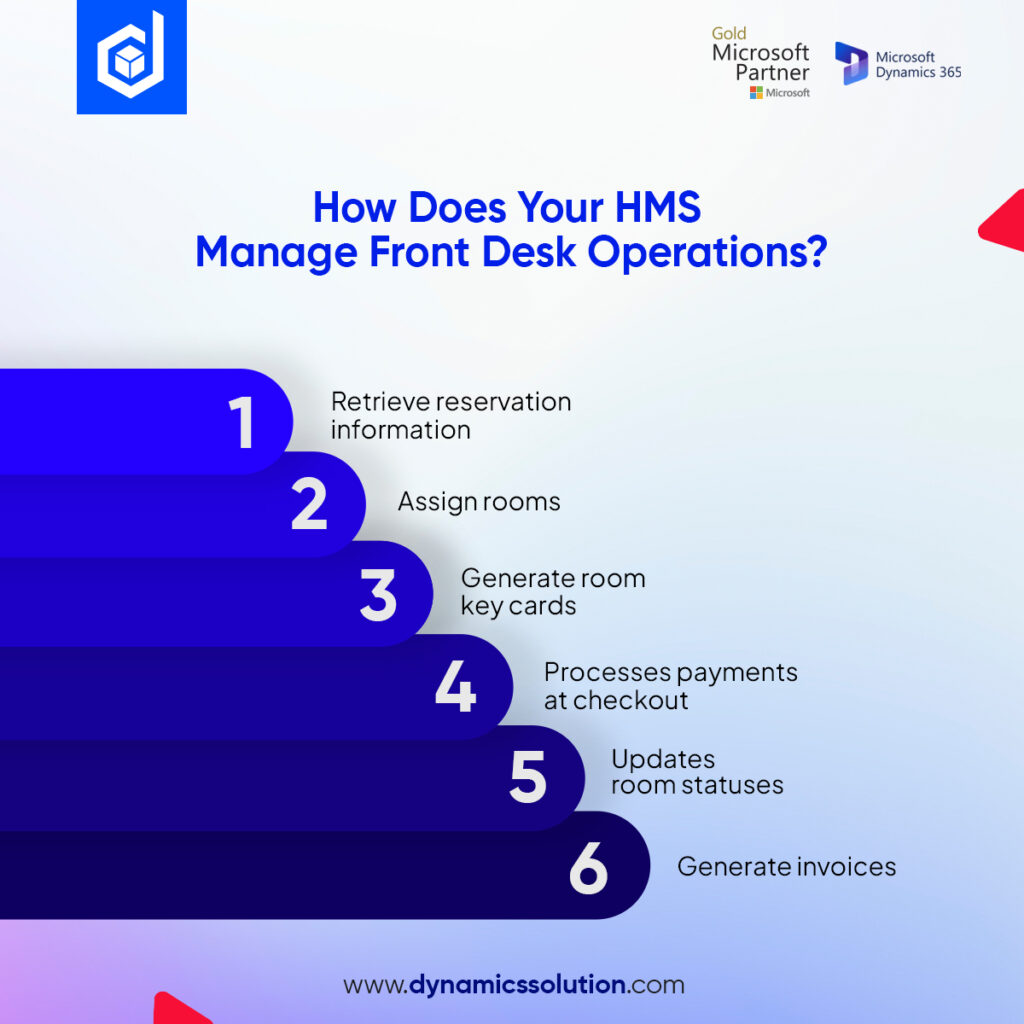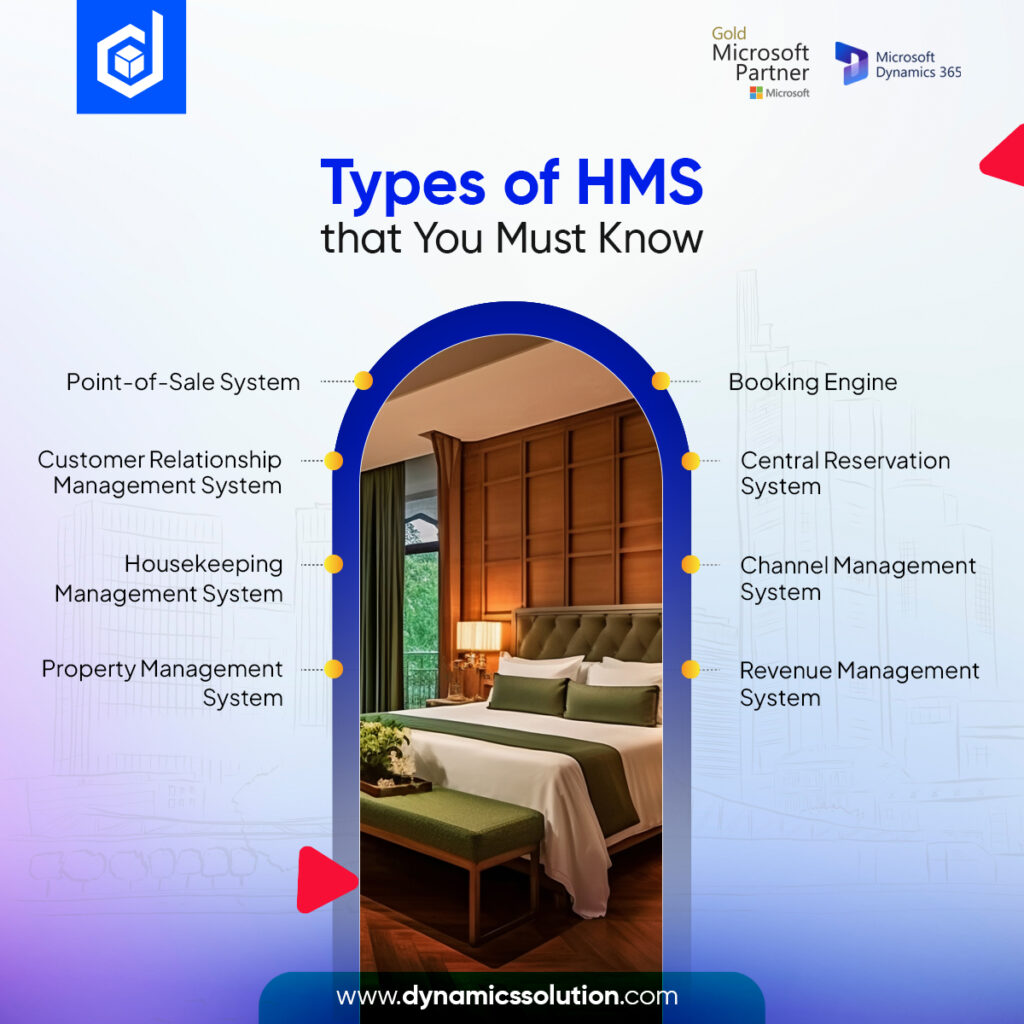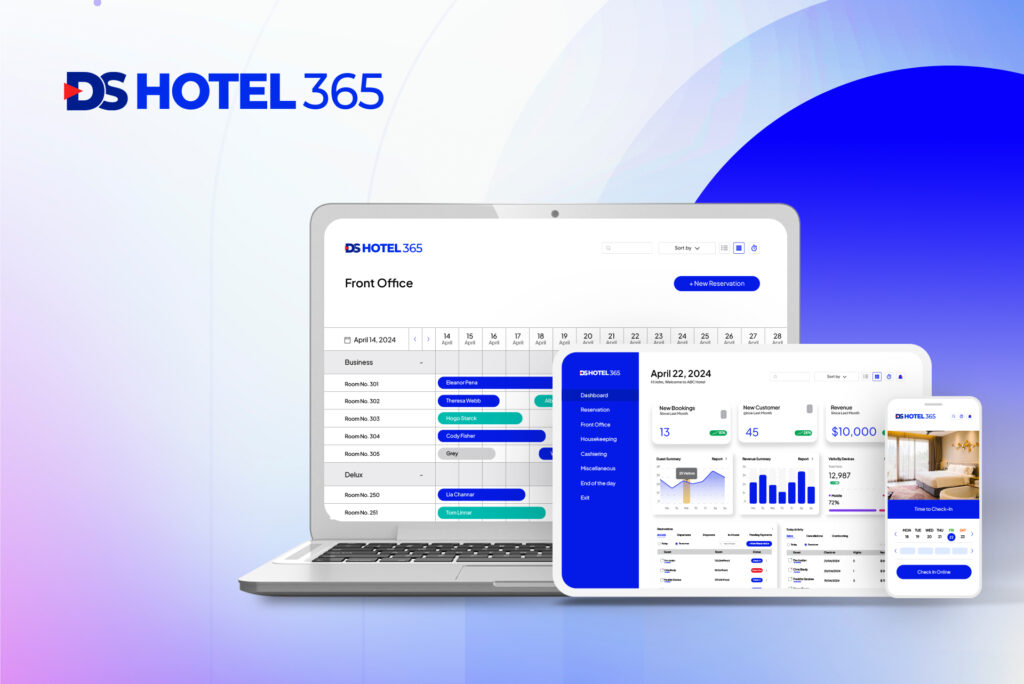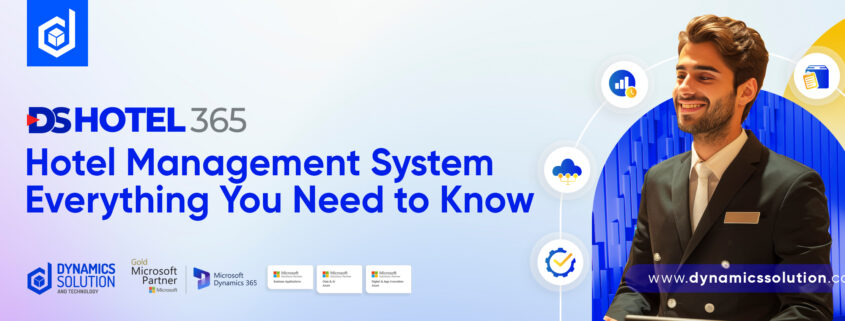The hospitality industry has grown substantially over the years with projections indicating a remarkable increase of $5.8 trillion in the total hotel occupancy by 2027. This immense growth underscores the critical importance of the hotel industry and emphasizes the urgent need for an efficient Hotel Management System.
Let’s start our blog with an introduction to the HMS and why the hotel management system is important.
What is a Hotel Management System?
A Hotel Management System (HMS) is a comprehensive software platform designed to streamline and automate various hotel operations and tasks. The HMS serves as a repository for all hotel data and is tailor-made for the hospitality sector. With everything in one place, both management and staff have access to all the data they need.
An efficient system typically includes modules for:
- Managing reservations
- Guest check-ins and check-outs
- Room assignments
- Housekeeping
- Billing and invoicing
- Inventory management.
- Point-of-Sale (POS) systems.
- Guest relationship management.
Along with the following functions:
- PMS
- Channel manager.
- Booking engine
- Metasearch integrations
- Business intelligence
- Rate management.
- Central reservation system
- Automation
To summarize, the best hotel management software helps hoteliers efficiently manage their properties, enhance guest experiences, optimize revenue, and improve overall operational efficiency.
How does a Hotel Management System Work?
A Hotel Management System (HMS) works by integrating various modules and functionalities to streamline and automate hotel operations. Here’s how it typically operates:
1. Reservation Management
You guests can make reservations through various channels, such as the hotel website, online travel agencies (OTAs), or over the phone. The HMS captures reservation details and updates the availability of rooms in real time.
For instance, your guest may visit your hotel website to book a room for a weekend getaway. They select their desired dates and room type, enter their personal details, and complete the booking process. Now, your system will capture this reservation, update the availability of rooms in real-time, and send a confirmation email to your guest. Transparent and simple workflow!
2. Front Desk Operations
Your hotel system handles your front desk operations by using the following workflow:

Upon arrival, your guest checks in at the front desk, and then your welcoming front desk staff access the HMS, retrieve the guest’s reservation details, and assign them a room based on their preferences/availability. Your system will automatically generate a key card for room access and update the guest’s status to “checked in.”
3. Housekeeping Management
This is one of your most important features in the Hotel system, as it assigns cleaning tasks to your housekeeping staff based on room occupancy and guest requests. Your trained concierge then uses mobile devices to update room statuses (e.g., cleaned, in progress, vacant) in the system.
For example, after the guest checks out, your hotel staff or supervisor receives a notification on their mobile devices through the HMS. They then access the system to view the list of rooms that need cleaning and prioritize tasks based on room occupancy and guest requests. Once the room is cleaned, they update its status ready for check-in.
4. Billing and Invoicing
Your well-mannered hotel staff did their job excellently; now it’s time to say goodbye (which is always hard, isn’t it?) to your respectable guests. For this, your system automates the billing process by generating invoices for guest stays, additional services, and incidental charges. It also integrates with payment processing systems to process payments securely and track outstanding balances.
5. Inventory Management
Imagine sitting in the toilet and could not find a tissue roll there! Not a good feeling to have, right? Now, picture a system that lets you know the number of items missing and, overstocked such as toiletries and linens, as well as non-consumable items like furniture and equipment. Saving your time and a positive review from customers. Inventory management monitors stock levels, generates purchase orders, and alerts staff when inventory needs replenishment.
6. Point-of-Sale (POS) Systems
Your reception is the first customer interaction point, making it the most important thing in converting your visitor to a customer. What if you start turning the pages of your register to check the available rooms, or your ancient POS system gets stuck in the middle of your room search? Your customer will never turn back!
That’s why an integrated POS system is needed, as it allows your team to manage revenue-generating outlets, such as restaurants, bars, and gift shops. Staff use POS terminals to process sales transactions, track inventory, and manage menu items and pricing.
For example, your guest dines at the hotel restaurant and orders a meal. The restaurant staff uses the POS terminal to enter the order, process payment, and print a receipt. The HMS integrates with the POS system to track sales, update inventory levels, and analyze revenue from food and beverage outlets.
7. Guest Relationship Management
An efficient hotel management solution captures guest information, preferences, and feedback, enabling hotels to personalize guest experiences and build long-term relationships. It facilitates communication through email, SMS, or mobile apps and tracks guest interactions for targeted marketing campaigns.
Example: The hotel collects guest feedback through online surveys or feedback forms during their stay. The information is stored in the HMS, allowing the hotel to analyze guest satisfaction scores and identify areas for improvement. Based on guest preferences and past interactions, the hotel sends personalized offers and promotions to enhance guest loyalty.
8. Reporting and Analytics
Any operational solution, built on using an elite tech stack, provides comprehensive reporting and analytics tools to monitor hotel performance, analyze trends, and identify areas for improvement. Your managers can access key metrics, such as occupancy rates, revenue per available room (RevPAR), and guest satisfaction scores, to make informed decisions.
For instance, the hotel manager accesses the HMS dashboard to view key performance indicators (KPIs) such as occupancy rates, average daily rate (ADR), and revenue per available room (RevPAR). They use this data to evaluate the hotel’s performance, identify trends, and make strategic decisions to optimize revenue and guest satisfaction.
In short, by implementing a Hotel Management Solution, you can centralize operations, improve efficiency, enhance guest experiences, and enable better decision-making to drive business success in the hospitality industry.
Types of Hotel Management Systems?
HMS come in various types, each catering to different needs and scales of hotel operations. Here are some common types:

Property Management Systems (PMS)
PMS software is the core system used to manage your day-to-day operations within a hotel, including reservations, check-ins, check-outs, room assignments, housekeeping, billing, and reporting.
You can use it to streamline operations, improve efficiency, and enhance guest experiences by ensuring smooth and seamless interactions at every touchpoint.
Central Reservation Systems (CRS)
CRS enables hotels to manage and distribute room inventory across various distribution channels, such as the hotel website, online travel agencies (OTAs), global distribution systems (GDS), and metasearch engines.
By centralizing workflows, you can optimize room availability, reduce reliance on third-party distribution channels, and maintain control over pricing and availability.
Channel Management System
CMS is mostly run by “channel managers” that allow hotels to synchronize room rates and availability across multiple online distribution channels in real-time, ensuring consistency and avoiding overbooking.
You can definitely rely on CMS to avoid overbooking, minimize manual errors, and ensure consistency in pricing and availability.
Revenue Management Systems (RMS)
This software helps you to optimize room pricing and maximize revenue by analyzing demand trends, competitor rates, and market dynamics to set optimal rates.
It allows them to set optimal rates, increase profitability, and achieve better revenue performance.
Point-of-Sale (POS) Systems
These systems are used to manage sales transactions and inventory within hotel restaurants, bars, gift shops, and other revenue-generating outlets.
Customer Relationship Management (CRM) Systems
CRM systems help hotels build and maintain relationships with guests by capturing guest data, preferences, and interactions to personalize communication and enhance guest satisfaction.
Housekeeping Management Systems
These systems not only streamline housekeeping operations by assigning and tracking cleaning tasks, managing room statuses, and optimizing staff schedules but also help hotels improve room turnover times, maintain cleanliness standards, and enhance guest satisfaction.
Booking Engine
A booking engine is a software application that allows your guests to make direct reservations through your website, providing a seamless booking experience and reducing reliance on third-party booking channels.
The choice of Hotel Management Solution depends on the specific needs, size, and budget of the hotel, as well as its operational requirements and growth plans.
What is an Online Hotel Management System, and Why Do You Need to Implement a Cloud-based HMS?
An Online Hotel Management System (HMS) is a software solution designed to streamline and automate various hotel operations and tasks, accessible through the Internet. Unlike traditional on-premises HMS, which requires installation and maintenance of software on local servers, an online HMS operates entirely in the cloud, with data stored and accessed remotely over the internet.
Why You Should Embrace Cloud-based HMS:
Here are the top Hotel Management System benefits:
1. Accessibility: It allows you to manage your hotel operations from anywhere, anytime. Whether you’re at the front desk or on the go, you have full control over your hotel’s activities.
2. Scalability: Say goodbye to limitations! An online hotel management system can effortlessly scale up or down to meet your hotel’s changing needs. No matter how much your business grows, your system can keep up.
3. Cost-effectiveness: Forget about hefty upfront investments and maintenance costs. With a subscription-based model, you pay only for what you use, making it a budget-friendly option for hotels of all sizes.
4. Security: Your guests’ data is precious, and online-based HMS providers understand that. They employ top-notch security measures to safeguard your data from unauthorized access and cyber threats, giving you peace of mind.
5. Automatic Updates: Most implementation partners provide automatic update features to continuously enhance your systems, ensuring you have access to the latest features and security patches without lifting a finger.
6. Integration and Customization: These systems often come with open APIs, allowing seamless integration with other systems and applications. You have the flexibility to customize your platform to match your hotel’s workflows perfectly.
In conclusion, it’s not just a tool; it’s your partner in delivering exceptional guest experiences and driving business success.
Where to Find the Right Hotel Management System?
We all know there are a lot of companies that are doing false marketing of their products and leaving their customers hanging in the air. Your fear of finding the right Hotel Management System is genuine, and we respect that. There are multiple ways to search for the best fit for your business, like industry conferences, online research, referrals, directories, industry experts, vendor websites, trade publications, local associations, online forums, and RFPs, but what if we save your time and introduce to the modern, unified, and fully integrated HMS?
DS Hotel 365— where innovation meets hospitality!
Let’s explore how it works and why DS Hotel 365 is the right HMS for you:
Why Trust Dynamics Solution and Technology for a Smart HMS?
Dynamics Solution and Technology has a proven 99% customer retention rate backed up with 100+ Microsoft professionals. It is their TRUST that keeps us fueling every single day and the reason they believe is the fact that every individual of our team has gone through a complete product cycle before providing consultancy to the customers. They acknowledge that our professionals understand the core tech terms and have know-how to facilitate you on runtime.
Here’s how your system will look like:

DS Hotel 365 is the most recommended HMS by 5-star hotels especially in the MENA and Gulf region. It is an all-in-one, innovative, and integrated cloud solution, developed on Microsoft Business Central, that not only evolves as per your customer needs, but also helps you redefine your hospitality experience.
It anticipates your every need, delivering a seamless experience from reservation to check-out. It assists you in:
- Reservation management
- Front desk management
- Channel management.
- Revenue management
- Housekeeping management
- Guest relationship management
- Invoices and payment management
- Point of sale integration
- Reporting & analytics
- Security & Compliance
Moreover, we also provide a (self-check-in facility with a top-notch user interface, world-class customer service, and smooth integration to automate your front office, housekeeping, cashiering, accounts, audits, staff management, and many more benefits based on your working requirements.)
The cherry on top is that it helps you provide a memorable guest experience with an opportunity to boost your business by 25% through distinguished visibility across multiple channels.
So, why settle for less when you can have it all? Join the ranks of successful hoteliers who have chosen DS Hotel 365 as their partner in excellence. Contact us here to revolutionize your hotel management experience today.







